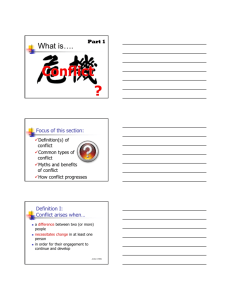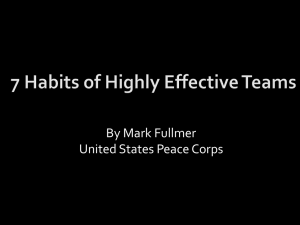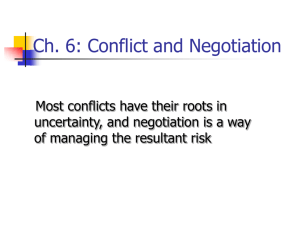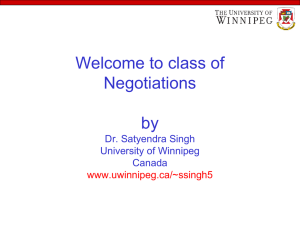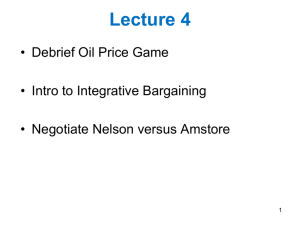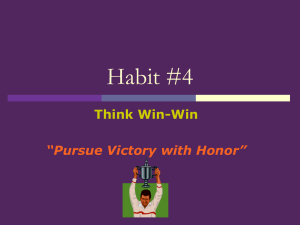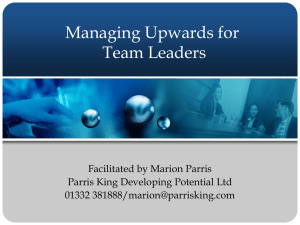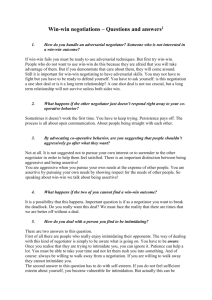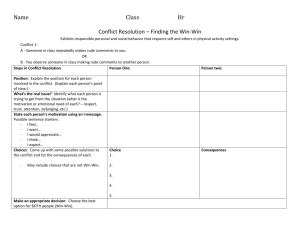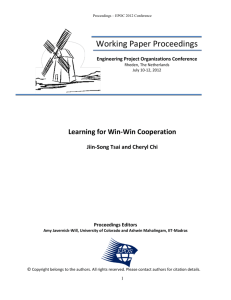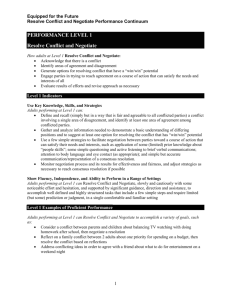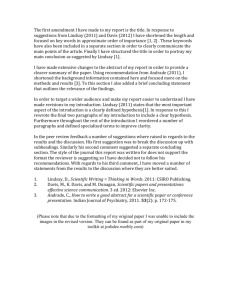Negotiation (PowerPoint) - Lancaster University Law Society
advertisement
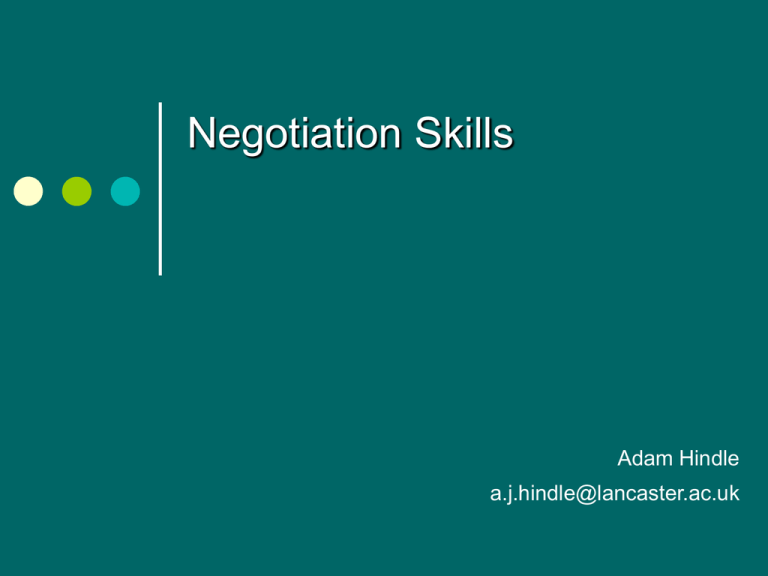
Negotiation Skills Adam Hindle a.j.hindle@lancaster.ac.uk a short history of me… PhD Research - Modelling of Costliness of Rurality with Dr. David Worthington at Lancaster Teaching: Project Management and Negotiation Skills Mathematical Modelling and Optimisation Excel Modelling Techniques for OR/MS Public Sector Applications Simulation - Flow Modelling, Queueing Data Analysis and Statistical Modelling Emphasis on case study work and the Process of OR Consultancy: Health Consultancy Services Ltd. A range of public sector projects. Clients include: Northern Ireland DHSS&PS, Countryside Agency, ODPM, Slovenian Health Service, PSCU in Canberra Why Negotiate? There is no single, optimum solution Negotiation can reveal the true value It’s a creative dialogue process that can generate a better “win-win” Every task that you don’t perform alone is negotiated – it’s rational thought, trust and relationships and because … …everything is negotiable! Partner: managing free time, child care Housemate: jobs around the house Friends: which pub/club to go to, favours Children: almost everything! Signing a contract, agreeing a sale price, deciding project scope, accepting a job, determining your workload The Main Stages Pre-Negotiation (Preparing the Ground) Argument (Getting the difficulties out into the open) Signalling (Indicating where movement might be possible) Bargaining (Proposal and Counter-proposal) Closing (Reaching a deal or contract) Value If you don't know what you want ... you won’t get it and if you don't ask for it ... no-one's going to give it to you Know what you want, how much you want it and then ask/offer/propose it “… it’s not the will to win, it’s the will to prepare to win.” Billy Bland, Bob Graham Round Quoted by R Askwith in ‘Feet in the Clouds: A Tale of Felling Running and Obsession’ “I take nothing for granted. I now have only good days or great days” Lance Armstrong “Genius is one per cent inspiration and ninety-nine per cent perspiration. Accordingly, a 'genius' is often merely a talented person who has done all of his or her homework” Thomas Edison Preparing the Ground The more each party is prepared for entering the so-called Negotiating Arena the better for everyone involved: Informal Discussions Workshops Presentations Prepared Position statements (inc. bids & tenders) SWOT analysis Brainstorm innovative options for mutual gain Anything to better understand your situation Preparing a Position (LIM)it the negotiation: Like to Get (Would like) Intend to Get (Want) Must Get (Need) Think big (the first number is the most dangerous, don't limit yourselves) Anchoring Know your TRUE 'walk away' point Tactical and Strategic gain Preparing a Position Try and anticipate the negotiation, e.g. what's going to be discussed? how much movement is likely to be needed? what's feasible? what are the alternatives? have a portfolio of equal value packages to offer Anticipate likely threats and promises Examine and list your own leverage & value Prepare Decision Supporting Systems paper based? spreadsheet based? Triple Think What do we want? What do they want? What do they think we want? No freebies!! You want something they don't value (maybe you can get it for free) They want something you don't value (but can concede for a high price) They want something from you that you want to do (and can sell it) Do not offer any free gifts Roles Leader empowered to make unilateral decisions does most of the talking Summariser buys thinking time by interviewing asks for clarifications or summarises Recorder (often technical or legal expert) observes for visual and verbal clues writes terms of offers made Analyst operates DSS model quickly assesses the implications of any offers and supports the leader by guiding the process talk listen think write plan Early Stages - Argument? Be constructive by: being assertive (i.e. clear and unemotional), looking for mutual advantage (win/win) and being prepared to LISTEN - it is more like a problem solving interview than a presentation Seek to understand and satisfy their interests - not necessarily their stated positions Avoid: aggression, point scoring, blaming, interrupting, speaking for long periods Be non-committal, never say never, and caveat everything with conditions. Nothing is black & white, keep it grey. Signalling Signalling means indicating a possibility of movement towards another parties wishes but without commitment (formal or informal) “these are our standard contract terms” “we never negotiate on price” “we do not normally give discounts” “as it stands, this wouldn’t be particularly attractive” “we are looking to improve” [direct signal] Note that a signal often relies on the spoken emphasis given to a word or phrase Some signals are less direct than others (see above) It is important to be able to formulate and send signals and hear them and receive them When hearing a signal, react quickly and question the meaning of the signal Proposing Go first! Use ‘if you .....then we’ rather than ‘if we ..... will you?’ Keep proposals and explanations separate Avoid negative statements: ‘couldn’t you give us a bit more?’ Never reject out of hand - seek clarification - then reject if necessary Incentivise not ‘negativise’ – focus on the positives Once definite proposals have emerged, bargaining on the deal and its details can commence. Learn to shut up Tactics 1. 2. 3. 4. 5. 6. 7. 8. 9. ‘Shot gun’: unless this, then … ‘Off-limits’: we can’t negotiate that ‘Goodcop/badcop’: nice guy negotiates ‘The Bully’: be prepared… ‘Russian front’: better of 2 alternatives ‘Salami’: slice by slice ‘Bluff’: pretend to walk Collaborative, Principled ‘Out of time’ (careful) Win-Win: Expanding the Pie What win-win is not : intuitive simply a compromise or even-split how the pie is divided but how the pie is enlarged feeling good/happy simply about building a relationship (although this is important) Win-Win: Expanding the Pie win-win is: Exploiting and developing all creative opportunities, where no resources are left on the table (integrative negotiation) signs: is there more than one issue? can other issues be brought in? can side deals be made? are there different preferences across issues? can we tie the deal to future performance? Closing the Deal Normally aim for a ‘final concession’ close – have one final small ‘gift’ up your sleeve! Try to avoid hitting your true bottom line – leave a little in the tank Record all relevant outcomes and agreements Ensure there is sufficient binding commitment (signatures etc.) Do not allow the negotiations to unravel due to ‘dubious definitions’ (intentional or otherwise) “sorry, I thought you meant…” Do not allow negotiations to be re-opened (assuming that you are happy with the outcome) If you have ‘lost’ try and link to other deals to be negotiated but, if you have ‘won’, do not allow this to happen A great deal is when both parties are still smiling
